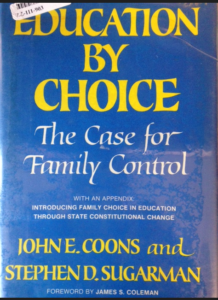Editor’s note: Our friend, John E.Coons, has been a regular contributor over the years to Step Up For Students policy blogs. Shortly after the 2021 release of his latest book, “School Choice and Human Good,” he was featured in a podcastED interview hosted by Doug Tuthill, chief vision officer and past president of Step Up For Students.

Berkeley Law professors Jack Coons and Stephen Sugarman, circa 1978.
Today is Jack Coons’ 95th birthday. Jack is a legend in the modern education choice movement. Along with former student and longtime colleague at the University of California Berkley Law School, the late Steve Sugarman, Jack wrote two books, "Private  Wealth and Public Education" (1970) and "Education by Choice: The Case for Family Control" (1978). These works inform and inspire our efforts to improve public education by empowering families to access the best learning options for their children.
Wealth and Public Education" (1970) and "Education by Choice: The Case for Family Control" (1978). These works inform and inspire our efforts to improve public education by empowering families to access the best learning options for their children.
Jack is a devoted Catholic, a passionate advocate for underprivileged families and their children, and a strong believer in the Catholic concept of subsidiarity, which means decisions should be made at the most local level. Hence, his decades-long advocacy for parental empowerment and education choice, especially for lower-income and minority families.
While I have been honored to do education choice work with Jack for the past 15 years, it is our friendship and his amazing humanity that I value the most. He is the ultimate Renaissance man and speaks intelligently about a wide range of topics.
My favorite Jack Coons story occurred one night while we were having dinner in Berkley with several colleagues. The restaurant was full, and the conversation at our table had wandered onto the theater and various show tunes. Suddenly, Jack burst into song and captivated the entire restaurant for about a minute with his excellent baritone singing voice. The restaurant burst into applause when he finished, and Jack calmly continued with our conversation as if nothing had happened.
He was just living his life. Happy birthday, Jack.
by Gloria Romero
Even while Gov. Jerry Brown and the California Teachers Association barnstormed the state, urging voters to raise taxes with Proposition 30 to support public education and predicting doomsday if the measure fails, a fascinating report from the California Charter Schools Association was released on the growth of charter schools in the Golden State.
Data from the report clearly reveal that change has come to California's public education system.
Charter schools are public schools. They are publicly funded but operate with greater independence, autonomy and flexibility from the burdensome state Education Code which micromanages even the minutia of education practices. Charter schools are typically nonunion, although they can be unionized if teachers vote for a union.
Charter schools were first established in the nation two decades ago, with California becoming the second state to authorize them. Hailed as opportunities for innovation and reform, charter schools began to grow.
Even beyond becoming recognized as "petri dishes for educational reform," the underlying philosophy of parental choice in public education began to take root. In a system where ZIP code is the sole criteria of school assignment, charters began to become a sort of "promised land" for high-poverty, minority families whose children were too often assigned to chronically under performing schools.
One-hundred nine new charters opened in California just this academic year, bringing the number of charter schools to 1,065, the most in the nation. Still, there are still 70,000 pupils on waiting lists. (more…)
Editor’s note: Progress in the parental school choice movement is measured not only by big gains in states like Indiana and Louisiana, but by the flurry of incremental developments in more states every year. Peter Hanley, executive director of the California-based American Center for School Choice, offers a look at encouraging developments in his home state.
 California has the nation’s largest charter school program, with 982 charter schools serving 412,000 students. But with nearly a two-thirds Democratic legislature heavily influenced by the California Teachers Association, tax credit scholarships or vouchers have been entirely off the table. In fact, charter schools’ flexibility is under near constant attack. Now, though, two legislators have introduced innovative approaches that address a unique feature in California’s constitution and attempt to bring educational tax credits to the state.
California has the nation’s largest charter school program, with 982 charter schools serving 412,000 students. But with nearly a two-thirds Democratic legislature heavily influenced by the California Teachers Association, tax credit scholarships or vouchers have been entirely off the table. In fact, charter schools’ flexibility is under near constant attack. Now, though, two legislators have introduced innovative approaches that address a unique feature in California’s constitution and attempt to bring educational tax credits to the state.
Unlike any other state, California has a voter-initiated constitutional amendment (Prop. 98) that sets a floor on the percent of general fund monies that must be spent on education. Anything that removes money from the general fund will instantly trigger the public education coalition to oppose it. So these legislators, one Democrat and one Republican, have proposed models that benefit both public and private schools.
Senate Bill 1542, introduced by Democratic Sen. Gloria Negrete McCloud, provides individual and corporate tax credits to Local Educational Advancement Program (LEAP) organizations. They will assist K-12 students from families with demonstrated financial needs to receive critical services before or after school, on weekends, or during the summer. SB 1542 precisely aims to ensure academic services - such as diagnostic evaluations, tutoring, summer school, and college and career planning and counseling - that have been heavily damaged by the extraordinary recession California has experienced since 2008. Although many more fortunate families in the state continue to be able to provide such services for their children, those with low and moderate incomes cannot and are disproportionately suffering. Children from public and private schools would be eligible for these services.
The Senate Governance and Finance Committee is expected to hold a hearing on this bill within the next few weeks. The future likely depends on whether it can be fit into the state’s budget, with questions now revolving around whether both individuals and corporations will be eligible for the credit, how large the credit will be, and whether it will be a straight credit or a percentage of a donation. Notably, the committee has not raised any objections about private school participation.
Assembly Bill 2582, sponsored by Republican Assemblyman Brian Nestande, takes a more traditional approach. (more…)